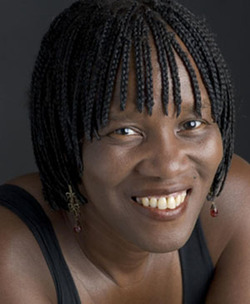|
|
Online Texts for Craig White's Literature Courses
|
|
|
Blonde White Women (1992) by Patricia Smith (b. 1955) |
|
Instructor's note: Born in Chicago in 1955, Patricia Smith has worked as journalist, poet, playwright, faculty for creative writing programs, and performer of spoken-word poetry, winning several "poetry slam" contests. The Boston Globe newspaper fired her in 1997 after detecting fabrications and made-up characters in prize-winning stories she reported. She has continued to work productively and win prizes and fellowships for her poetry.
Discussion question(s):
1. What attitudes are revealed toward assimilation to the American dominant culture? If Smith as African American is a minority rather than an immigrant, how may these attitudes be similar to or differ from immigrant attitudes toward assimilation? What are the limits or complications for education as a medium for assimilation?
2. What symbols or codes are associated with the American dominant culture?
3. What about the color code? Does Smith's poem uphold or subvert it?
4. If assimilation for immigrants resembles a conversion narrative, how does the story told by this poem differ? Instead of assimilation, what kind of cultural process is implied?
![]()
Blonde White Women
They choke cities like snowstorms
On the morning train, I flip through my
Ebony
[magazine for African American market]
marveling at the bargain basement prices
for reams of straightened hair
and bleaches for the skin. Next to me,
5
skinny pink fingers rest upon a briefcase
shiver a bit under my scrutiny.
Leaving the tunnel, we hurtle into hurting sun.
An icy brush paints the buildings
with shine, fat spirals of snow
10
become blankets, and Boston stops breathing.
It is my habit to count them. So I search
the damp, chilled length of the train car
and look for their candle flames of hair,
the circles of blood at their cheeks,
15
that curt dismissing glare
reserved for the common, the wrinkled, the black.
I remember striving for that breathlessness,
toddling my five-year-old black butt around
with a dull gray mophead covering my
20
nappy hair, wishing myself golden.
Pressing down hard with my
carnation pink Crayola, I filled faces
in coloring books, rubbed the waxy stick
across the back of my hand until the skin broke.
25
When my mop hair became an annoyance
to my mother, who always seemed to be mopping,
I hid beneath my father's white shirt,
the sleeves hanging down on either side of my head,
the coolest white light pigtails.
30
I practiced kissing, because to be blonde and white
meant to be kissed, and my fat lips slimmed
around words like "delightful" and "darling."
I hurt myself with my own beauty.
When I was white, my name was Donna
[cf. "madonnas," l. 54] 35
My teeth were perfect; I was always out of breath.
In first grade, my blonde teacher
hugged me to her because I was the first
in my class to read, and I thought the rush
would kill me. I wanted her to swallow
40
me, to be my mother, to be the first fire
moving in my breast. But when she pried
me away, her cool blue eyes shining with
righteousness and too much touch
I saw how much she wanted to wash.
45
She was not my mother,
the singing Alabama woman [Alabama > Boston=Great Migration (20c) of
African Americans from U.S. South to North]
who shook me to sleep
and fed me from her fingers.
I could not have been blacker
50
than I was at that moment.
My name is Patricia Ann.
Even crayons fail me now—
I can find no color darker,
more beautiful, than I am.
55
This train car grows tense with me.
I pulse, steady my eyes,
shake the snow from my short black hair,
and suddenly I am surrounded by snarling madonnas
[compare "Donna," l. 30]
demanding that I explain
60
my treachery.



